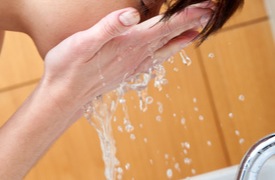
Acne vulgaris, otherwise known as acne, blackheads, pimples, whiteheads or zits, appears in the form of red bumps that are usually isolated to the patient's face. Another name for blackheads and whiteheads is comedones. Blackhead comedones have black hue and wide opening while whiteheads have no hue and a small opening.
Identifying Acne VulgarisThe condition of acne vulgaris is relatively easy to identify. Most patients will typically notice small, elevated bumps on their skin that are red, tender or filled with pus. However, some patients may see large, painful bumps too. Pus-filled bumps located beneath the skin's surface are known as cysts, which may cause scarring and infections.
In order to determine the severity of acne vulgaris, the patient should visit a dermatologist. Patients with mild acne vulgaris cases will have no more than 20 comedones or 30 lesions. Moderate acne vulgaris patients have 20-100 comedones or 30-125 lesions and severe acne vulgaris patients have at least 101 comedones or 126 lesions.
Preventing Acne VulgarisWhen hair follicles on the skin become clogged with dead skin sells or sebum, a naturally produced oil made by the skin, acne vulgaris may form on the affected areas of the body. Some people are more susceptible to acne vulgaris than others, such as teenagers and pregnant women who may be more sensitive to hormonal changes, which tend to cause an overproduction of sebum. People who regularly use cosmetics also experience more flare-ups.
Treating Acne VulgarisPatients can usually prevent mild acne vulgaris breakouts by using basic Skin Care techniques. It is recommended that sufferers wash their skin with mild cleansers instead of facial scrubs and harsh astringents. Those who have oily skin may benefit from benzoyl peroxide or salicylic acid solutions that can be purchased over the counter.
For more severe breakouts, the patient can obtain prescription medications from their dermatologist. The most common prescription topical applications include adapalene, tazarotene and tretinoin. In other cases, a patient's acne vulgaris can be treated with isotretinoin or oral antibiotics.
There are some patients who have experienced positive results from laser therapy. Acne vulgaris patients who undergo laser therapy can not only decrease their skin's sebum production but also reduce the associated inflammation. Dermatologists may also give their patient a chemical peel or microdermabrasion in order to resurface the patient's skin.
What else can I help you with?
What is the scientific name for acne?
Acne vulgaris
What illness can you use tenutan for?
Tenutan is an antibiotic used for treating different kinds of Acne such as Acne Vulgaris,Acne Conglobata and Acne Rosacea. The active ingredient is Doxycycline and has slightly lighter side effects than Roaccutane.
What are the symptoms of acne vulgaris?
Acne disorder
What actors and actresses appeared in Acne Vulgaris - 2012?
The cast of Acne Vulgaris - 2012 includes: Ryan Leopold
What are the differences between all the different types of acne?
Acne vulgaris is a specific term for the regular kind of acne, though there can be different levels of severity within the disease. Vulgaris is actually the Latin for "common."
What are some treatments for acne vulgaris?
Acne Vulgaris or more commonly known as Acne has a variety of treatment options. Some include an astringent which is used to deep clean skin as well as moisturizing face washes.
What benefits does salicylic acid provide for treating acne?
Salicylic acid helps treat acne by exfoliating the skin, unclogging pores, reducing inflammation, and preventing future breakouts.
What essential oil is used for acne?
There are many essential oils that are used effectively for treating acne skin, from preventing breakouts to healing and reducing scarring. See the Related Links for more information.
The chronic inflammatory disease that is characterized by pustular eruptions of the skin in or near the sebaceous glands is known as acne?
acne vulgaris
How effective is salicylic acid in lip balm for treating and preventing acne breakouts on the lips?
Salicylic acid in lip balm can be effective for treating and preventing acne breakouts on the lips. Salicylic acid helps to exfoliate the skin and unclog pores, reducing the likelihood of breakouts. However, individual results may vary, and it is important to use the product as directed for best results.
What do you call it when little tiny pimples grow on you?
the correct term for pimples is acne vulgaris
What is the skin condition caused by clogged pores?
Clogged pores can cause tiny bumps to appear on the skin.
